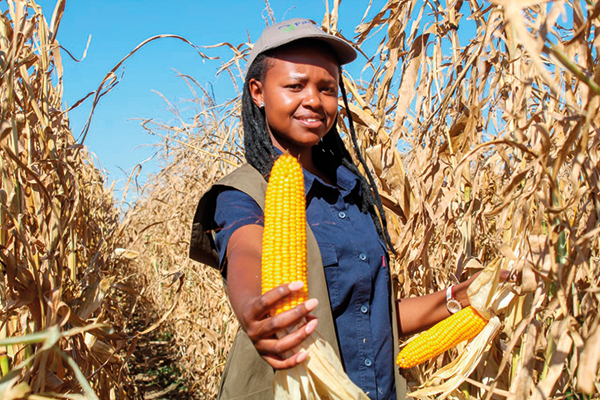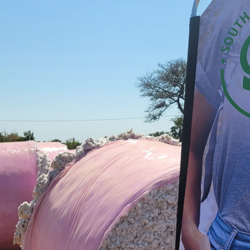Agricultural services company FarmSol Holdings is keenly focused on supporting the needs of black farmers. The FarmSol model aims to incubate emerging farmers into thriving businesses, by linking them to the key pillars of growth: access to markets, finance, training and mentorship. Peter Mashala spoke to FarmSol managing director Aron Kole about their track record in sustainable development.
The FarmSol farmer support programme is focused on developing smallholder farmers into sustainable commercial farmers. Since 2016, it has supported the growth of thousands of smallholders and emerging farmers by providing market access, innovative funding, extension services and mechanisation solutions.
To date, it has disbursed about R800 million in production loans across eight provinces. Over R100 million has been paid to smallholder farmers in profits, with R23 million in profits paid in the summer crop season of 2022 alone.
“South Africa’s agricultural growth is only meaningful if emerging farmers contribute to the agricultural output. Black farmers’ success is directly related to economic growth, food security, agricultural sustainability and rural development,” says FarmSol managing direc tor, Aron Kole.
The company was launched in 2016 by South African Breweries (SAB) through an enterprise and supplier development fund, dubbed the SAB Thrive Fund. Initially, as an implementation agent for SAB, the company offered support services under the Go Farming programme. With the merger of SAB and AnheuserBusch InBev (AB InBev), FarmSol became an implementing partner to support SAB’s agricultural development initiatives.
“Currently, we work with black farmers by facilitating loans, negotiating offtake agree ments, providing trade access, and assisting with grain hedging (to mitigate price risk). Moreover, we provide tailored support and onfarm training through our dedicated team of mentors and agrispecialists,” said Aron.
The lack of mechanisation, according to Aron, is one of the biggest challenges smallholders face. They have now partnered with John Deere to provide mechanisation solutions to their project. PHOTOS: FARMSOL
MAKING A DIFFERENCE
FarmSol aims to create an impact for black farmers through five programmes: Go Farming, Household Food Security, Women in Agriculture, Mechanisation and the FarmSol Youth Ambassador Programme. The Go Farming programme provides production loans, mentorship and training to black farmers. Over 982 smallholder farmers across South Africa have received support through the programme, planting 53 000ha of crops such as maize, barley, sunflowers and groundnuts.
Over 426 smallholder farmers are supported by the Household Food Security programme, which is a partnership between FarmSol, SAB and Ukhanyo Farmer Development. “We provide mentorship and production input subsidies to subsistence farmers in the Eastern Cape,” says Aron.
Ukhanyo currently works with 600 smallholder and subsistence farmers in the Eastern Cape. The NPO was founded by Eastern Cape commercial farmer Sinelizwi Fakade, to share knowledge about farming and achieve the highest quality harvest through mentorship and an incubator programme.
The company is also intentional about supporting women through its Women in Agriculture programme. A primary focus is to improve economic inclusion for female farmers, including youth and people with disabilities, by providing expansion capital and assistance with infrastructure development.
The FarmSol Youth Ambassador programme, which was launched in 2020, provides inspiration and support to young aspirant farmers, especially to black and female farmers. The fifth programme, Mechanisation, unlocks opportunities for new farmers to access the latest technology and mechanisation options.
Aron Kole, FarmSol’s managing director who has been at the helm for three years, says the company supports thousands of smallholders and emerging farmers by providing them with market access, innovative funding, extension services and mechanisation solutions.
One of the ways to keep farmers informed is through a series of information days where farmers learn from other experts and farmers.
SUCCESSION PLANNING FOR SUSTAINABLE SUCCESS
Aron attributes the success of youth empowerment programmes to the succession plans laid down by the farmers themselves. Succession planning protects farmers’ assets, safeguards their business, ensures continuity, and provides for their families even when they’re no longer around.
“Succession is imperative not just for individual farmers but also for the industry, which is under threat because most farmers are over 60,” says Aron.
As an example of a successful succession plan, he points to Jacob “Koos” and Clifford Mthimkhulu from Astoria Farm in Senekal, Free State. Clifford, a FarmSol Youth Ambassa dor, farms with his dad, Koos, on about 1 00ha, producing maize, sunflowers, soya beans and livestock.
They have implemented a succession plan that ensures continuity after Koos retires or passes away unexpectedly.
The Mthimkhulu’s are part of FarmSol’s Go Farming programme which provides them with a production loan and access to markets. As part of SAB/AB InBev’s supply chain, they provide raw materials to the beverage maker.
William Matasane and Israel Motlhabane, who both work with their sons, are also prime examples of black farmers who have put effective succession planning in place.
“This is more than just planning your retirement. It is also about making sure the business runs smoothly after you step down. In planning your business legacy, you leave behind your vision and goals for the future success of the organisation,” Aron explains.
SUPPORTING FEMALE FARMERS
Since 2016, the company has supported 397 female farmers, and this number continues to grow. One of the farmers in the programme, Minkie Kgopa, switched from her career as a business consultant to farming on the family farm near Lichtenburg, in the North West. She is testament to the growing number of women entering agriculture.
“There can be a lot of loneliness in the agricultural industry for women, especially when it comes to finding mentors or people to learn from. Having my dad and FarmSol help me from the beginning was a significant advantage,” says Minkie.
Another female farmer is Njabulo Mbokane, a FarmSol Youth Ambassador from Ermelo in Mpumalanga. Njabulo is the 2019 SAB- FarmSol Young Emerging Farmer of the Year, and farms grains and vegetables on more than 200ha of rented land.
“As a farmer, one of the biggest challenges I faced was my soil. The pH level was low, which negatively affected my yields. With FarmSol’s help, I was able to correct my soil quality and achieve a great deal more,” says Njabulo.
Since 2018, Promise Ntuli and her brother Nqobiziswe have leased 100ha in Bankkop Fere, in the Free State. Under the FarmSol development programme, the Ntuli siblings secured a loan at 0% interest to plant 50ha of non-GMO yellow maize in 2019.
“As a new farmer, I was excited and happy, but reality soon bit when our first year was challenging,” says Promise. Because they could not secure the correct implements on time, they planted too late. A drought followed which resulted in a very small crop. “We were unable to settle our debt and I remember feeling terrible,” she recalls.
Having learned from their mistakes, they secured another FarmSol loan in 2020 to establish 100ha of non-GMO yellow maize on contract with SAB. “Young people should realise that farming offers many opportunities, but success requires dedication and patience,” advises Promise.
Nobantu Radebe farms on 44ha of family-owned land in the Sedibeng district outside Vanderbijlpark, in Gauteng. Emangelengeleni Enterprises is a mixed farming operation that produces yellow maize, vegetables and broilers.
“We appreciate the market access we gained from FarmSol because it is one of the most critical aspects of sustainable farming,” says Nobantu.
Clifford Mthimkhulu, a FarmSol Youth Am- bassador, farms about 1 000ha with his father, Jacob “Koos” Mthimkhulu, producing maize (left), sunflowers, soya beans and livestock.
Succession planning and execution is key to the long-term survival of a farming business. Some of the farmers on the programme are a shining example of good succession plan. Back row from left: Barry Nel (FarmSol), Johan Kriel (Grain SA) William Matasane, Happy Letsitsa, Kgomotso Motlhabane (Israel’s son), Jacob Mthimkhulu and Aron Kole (FarmSol MD). Front row from left: Mokoboka Matasane (William’s son), Israel Motlhabane and Clifford Mthimkhulu (Jacob’s son).
SUPPORT BEYOND GRAINS
In Aron’s view, most farmers fail because they plant certain crops simply due to funding and an off-take market being available for that
particular crop. This should not be the case. “It’s not because they have the necessary skills, knowledge or experience to produce that crop, or because their farms are structured – production wise – to produce that crops,” he explains.
As a result, they are forced to practice monocropping since the funder is only interested in one product.
“If I come as a company with an interest in white maize or non-GMO yellow maize, I can only provide funding for that crop even if that is not the most suitable crop for your farm. Once that support is removed, the farm may collapse,” Aron emphasises.
FarmSol approaches things differently. “In order to maximise the potential of an enterprise, we need a business approach focused on the overall farm potential. Regardless of whether I am interested in a specific crop, I should strive to provide holistic support to the entire enterprise.
“It is crucial to have a clear and diverse crop production strategy, such as crop rotation, for crop farmers.”
Multi-stakeholder collaboration is the only way to do this and advance black farmers, he says. No single entity can claim to do it on its own because of limitations in funding, skill sets, and many other factors, he adds. “Farmers, banks, agribusinesses, corporations and government must all play a role.”
The Go Farming programme has already expanded beyond SAB’s supply chain. Farmers have been supported in the production of sunflowers, groundnuts and other cash crops. “As a result, we are able to accommodate more farmers and offer more opportunities,” Aron says.
The organisation has expanded its network of partners over the years to include Siqalo Foods, South African Cultivar Technology Agency, Maize Trust, Oil and Protein Seeds Development Trust, and Oilseeds Advisory Committee.
The reach and impact of the programmes has been expanded among beneficiary farmers thanks to the support of the partners. Through the Siqalo Grower Empowerment Programme, they work with Siqalo Foods to provide smallholder farmers with direct access to the company’s supply chain. This allows their products to be used to produce household food brands like Rama, Stork Margarine and Rondo.
MECHANISATION
The lack of mechanisation is one of the biggest challenges that smallholders face. Mechanisation technologies are expensive.
“Through our mechanisation programme we try to solve one of the major chronic challenges facing emerging farmers – lack of access to mechanization and technology,” says Aron.
Mechanisation is not just about the size of the equipment or the most powerful tractor. Instead, it is about technology that allows a farmer to be more precise, efficient and safe, and to increase profitability.
“Agricultural funders are able to fund production easily but they are not prepared to fund implements and equipment.
“Consequently, farmers are forced to rely on contractors who sometimes overcharge them,” says Aron.
FarmSol also rents equipment to farmers at low rates, he says. “Farmers are not bound by any contract to hire our equipment, but they do have the option to do so. As a result, we are in a position to disrupt the contracting market, forcing contractors to charge competitive rates,” he explains.
The mentorship and agronomic expertise from industry experts help to equip farmers with the skills to achieve top harvests, like the fine maize cobs above attest to.
LAND WITH NO SUPPORT IS A RECIPE FOR FAILURE
Mentorship is important to success and FarmSol mentor Barend “Barry” Nel works with 29 farmers across the Free State province on a contract basis.
With more than 40 years of farming experience, there is nothing the 61-year-old likes better than getting dirty and working the soil. He enjoys his job and is happy to pass on his experience and knowledge to younger farmers who need it, and to do his bit to ensure food security.
“Going forward, we must develop our farmers because at the end of the day, there is no future without food. I’ve seen a lot of newly trained farmers making progress in our country, especially our developing farmers.
“Even the guys who grew up on farms don’t have the knowledge to lead successful commercial farms,” he says.
Originally from KwaZulu-Natal, Barry has been part of the company since inception. “I supplied white maize grits to SAB, which was exported to Angola for brewing purposes. This is how I got to know about FarmSol,” Barry says.
Before joining FarmSol, Barry ran a crop farm in Winterton, KwaZulu-Natal, with his late father Frik. They moved from the Free State to KwaZulu-Natal for better agricultural opportunities. In addition to the opportunity to grow a wider range of commodities, the farm had an irrigation system that allowed them to do double cropping.
“We could grow wheat for our winter crop as well as either maize or soybeans for our summer crops,” he explains. The Nels also grew potatoes and owned a milling facility. In 1998, Frik retired and moved into a retirement village with Barry’s mother. That same year, Barry bought the 60ha farm Malta in Winterton.




